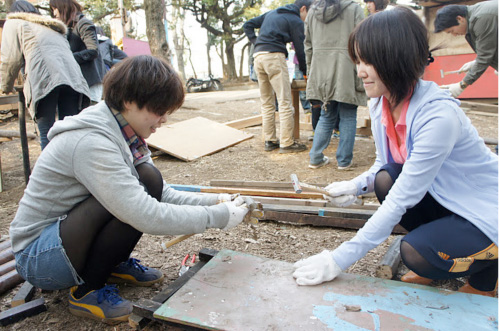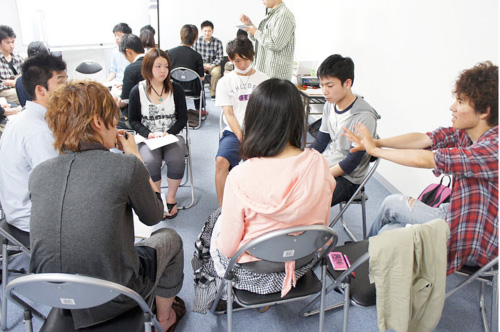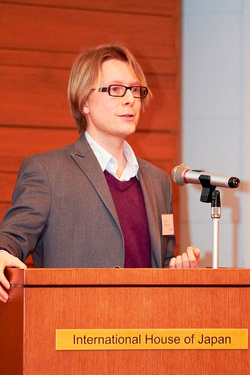Japanese Youth after 3.11: From Underdogs to Change-makers?
Tuukka Toivonen, Ph.D.
University of Oxford
"We provide a volunteer programme to students that has a low threshold to participation and that stimulates students' interest to get involved in long-term support activities. We have dealt with various bottlenecks that typically prevent young people from going to the disaster areas. This is the essence of the new model [shikumi] we have built. I believe that delivering some of the 'young power' that students possess to the disaster-struck regions will prove highly valuable a resource in the reconstruction process".
-FUNATO Yoshiaki in the Shushoku Journal, 9 December 2011.
This brief quote from the leader of Youth for 3.11--student-led organization that dispatches university students to volunteer in Tohoku--conceals several important messages about the role of young adults in post-tsunami, post-Fukushima Japan. Just as the youth who wish to help rebuild Tohoku have faced serious social-structural 'bottlenecks' along the way, so do young adults in Japan more generally face great resistance as they strive to reinvent their struggling society. Increasingly marginalized from traditional politics (and disliking the very term seiji), they have had to find novel ways to respond to pressing social needs and contradictions. One emerging method is to develop new operational 'models' that generate 'value' to various groups of 'stakeholders', including tsunami victims, severely impoverished single mothers and the homeless. Funato, who is one of the initial founders of Youth for 3.11 as well as the author of three accessible science study books, is only one of many such young actors who harness a business-oriented vocabulary to advance their goals. Other, more well-known, examples include social entrepreneurs such as Komazaki Hiroki of Florens, a childcare service that caters to ill children, and Yamaguchi Eriko of Mother House that sells Bangladeshi-produced luxury handbags for Japanese consumers and returns part of the profits to the workers' communities ('the stakeholders').

Youth for 3.11 volunteers help to re-build a children's playground that was destroyed by the colossal tsunami of March 11, 2011. Photo source: Youth for 3.11
On January 12, 2012, I had the pleasure to deliver a short presentation on precisely these issues, organized around the theme of 'Japanese youth after 3.11', at an event held at the International House in Roppongi, Tokyo by the Japan Foundation. Drawing on my interviews and ethnographic fieldwork with Youth for 3.11 (carried out in July and November, 2011), I argued at this event that (1) the vast majority of Japanese youth had in fact done very little to respond to the emergency in northeastern Japan; that (2) universities had done far more to prevent hands-on volunteering than to promote it; and that (3) instead of asking whether Japan will or will not change as a result of the triple disaster of March 2012, social scientists and journalists would benefit from focusing on the question of who will change Japan and how. The references I have indicated below address points (1) and (2) in some depth, so I will focus only on the third issue here. Who, in other words, are the ones with the ideas, the motivation and the networks to tackle the battery of 'bottlenecks' that continue to plague Japan especially at the local, national and transnational levels?
Before addressing this question head-on, it is useful to dedicate a few lines to recalling how 20-somethings were discussed in the Japanese media in the 1990s and the 2000s. Interestingly, two mainstream perspectives characterized this era. The first was that youth are essentially moral degenerates without a proper work ethic ('ima goro no wakamono wa keshikaran'). This was clearly the salient tone of the debate on the part-time-working freeters in particular. Another perspective gradually emerged to challenge this view, however. Spearheaded by the likes of Genda Yuji and Honda Yuki, this second perspective maintained that youth were in fact the underdogs who were made to shoulder disproportionate costs during Japan's two 'Lost Decades' (they were said to have lost more jobs than their parents' generation and/or to have become non-standard workers, easily exploited by employers). Despite this rebuke, the first mainstream perspective - the one that framed youth as morally inferior to older generations - more or less continued to dominate within the domestic media up to 2011. The second line of argument was endorsed predominantly by sympathetic (or 'youth-friendly') bureaucrats, commentators and policy experts. The foreign media, while rather naively taking popular categories such as parasite singles, hikikomori and NEET almost at face value, has sided with the latter camp, viewing Japanese youth as an increasingly marginalized group.
Did the status of Japanese youth as either semi-stigmatized sluggards or as societal underdogs change after the terrible tragedy that struck Japan on March 11, 2011? To some extent, yes: With a steady trickle of news stories that featured young people traveling up to Tohoku to contribute to rebuilding efforts, it became harder to label all young people as lazy, passive, inward-looking or pitiful. Indeed, there were new expectations, in both the domestic and international media, that Japanese young people should play a central role in the reconstruction process. But such expectations were usually not coupled with significant resources and policies to, for example, facilitate more widespread volunteering involvement. The same is true of young people's struggles with various employment-related issues and other 'bottlenecks' in today's Japan: few resources have been allocated to realizing more environmentally and socially sustainable working styles, for example.
So the onus to substantially re-shape their society is, once again, back on the young people themselves. But is there an emerging mass youth movement or even a volunteering rush in sight, or is the majority of Japanese youth, as a recent book by Furuichi Noritoshi suggests, simply 'too happy' or content to muster momentum for anything more than a few confused one-off demonstrations in central Tokyo?

Youth for 3.11 volunteers discussing their experiences in Ichigaya, central Tokyo. 'Reflection meetings' are an essential part of Youth for 3.11's programmes. Photo source: Youth for 3.11
In a previous study with a Japanese and an American colleague (Toivonen, Norasakkunkit & Uchida, 2011), we concluded that it is indeed highly unlikely, for both psychological reasons (including the prevalence of so-called avoidance motivations) as well as historical-contextual factors (including the well-documented downfall of the young business challenger Horie Takafumi; and the thorough de-legitimatization of the old student movement), that youth in Japan would suddenly decide, in the 2010s, to mount continued, conflictual protests against their government or other dominant institutions such as large corporations. Instead, we found that it is far more likely that young people will develop comparatively subtle strategies for change rather than engaging in head-on conflict.
This empirical and theoretical exploration, grounded in labour market and psychological data as well as individual cases, led us to the identify a sub-group within Japanese youth we call the 'quiet mavericks'. This group that sits partly outside dominant societal norms and ideas about standard life-courses is distinctive in that its members:
(1) articulate original ideas and social visions;
(2) employ original methods (e.g. using business approaches to address social issues);
(3) craft implicit strategies to challenge the status quo (e.g. sell luxury products for profit while rewarding poor craftsmen instead of shareholders in rich countries);
(4) incorporate internationally diffused ideas (such as "social investment"); and
(5) fuse "Japanese" and "global" values (such as interdependence and individual choice)
 Now, at this early stage of inquiry, 'quiet mavericks' needs to be defined rather loosely to permit and indeed promote exploratory research into young leaders in Japan. Many of the strategies employed by 'quiet mavericks' are still unknown and can be best illustrated via case studies rather than a priori theorization. There are several established sociological concepts that can be applied here, including cultural capital (which often seems to reveal, in the case of 'quiet mavericks', socialization in a corporate environment and mastery of business discourse) and social capital. The latter reminds us that the maverick youth we need to study are unlikely to amount to isolated, independent agents but are instead likely to include heavily networked individuals who act in teams and seek to collaborate with a variety of institutions (local/national governments, small/large corporations, the media, other related groups etc.). For those keen to understand, say, young leaders in the social entrepreneurship area, it is imperative, then, to pay attention not just to individual characteristics, but also to tightly interlinked groups as well as wider 'innovation ecosystems'. While the mainstream media will always seek out 'heroes' and inspiring personal narratives, the social scientist's task is to explain the embedded nature of even those relatively individualistic young people who actively push for social change and alternative lifestyles.
Now, at this early stage of inquiry, 'quiet mavericks' needs to be defined rather loosely to permit and indeed promote exploratory research into young leaders in Japan. Many of the strategies employed by 'quiet mavericks' are still unknown and can be best illustrated via case studies rather than a priori theorization. There are several established sociological concepts that can be applied here, including cultural capital (which often seems to reveal, in the case of 'quiet mavericks', socialization in a corporate environment and mastery of business discourse) and social capital. The latter reminds us that the maverick youth we need to study are unlikely to amount to isolated, independent agents but are instead likely to include heavily networked individuals who act in teams and seek to collaborate with a variety of institutions (local/national governments, small/large corporations, the media, other related groups etc.). For those keen to understand, say, young leaders in the social entrepreneurship area, it is imperative, then, to pay attention not just to individual characteristics, but also to tightly interlinked groups as well as wider 'innovation ecosystems'. While the mainstream media will always seek out 'heroes' and inspiring personal narratives, the social scientist's task is to explain the embedded nature of even those relatively individualistic young people who actively push for social change and alternative lifestyles.
How does Funato, the stylish and multi-talented representative of Youth for 3.11, fit this formulation of 'quiet mavericks'? Extremely well, it would seem: In addition to his Twitter-powered volunteering group, Funato is one of the most enthusiastic importers to Japan of the American concept 'edutainment' ('education+entertainment'). Upon failing to find substantial examples of 'edutainment' in his own country, Funato simply decide to 'do it himself' and create original ways to make learning more fun as well as more effective. But his friends tell him that he has also become more of a team player after emerging as the leader of Youth for 3.11. It would seem that Funato, perhaps never a true 'underdog' as such, is now well-equipped to join the ranks of Japan's foremost change-makers. We can only hope that thousands of others will follow his example, and that the observers of Japanese young people--regrettably often held back by persisting cultural stereotypes from the 1990s and 2000s--will pay some attention.
 Tuukka Toivonen
Tuukka Toivonen
Tuukka Toivonen is Junior Research Fellow at Green Templeton College, University of Oxford (www.tuukkatoivonen.com) as well as a Japan Foundation fellow. He currently investigates Japanese young workers' motivational processes, social entrepreneurship and related policies from a comparative angle.
http://oxford.academia.edu/TuukkaToivonen
Related Events
Keywords
- Culture and Society
- Social Securities/Social Welfare
- NPO/NGO
- Social Enterprise
- Japan
- 3.11
- Great East Japan Earthquake
- Students
- Yoshiaki Funato
- Support for reconstruction
- Volunteering
- Tohoku
- Youth for 3.11
- Tsunami
- Nuclear accident in Fukushima
- Single mothers
- Homeless
- Shildcare service for ill children
- Florens
- Hiroki Komazaki
- Mother House
- Eriko Yamaguchi
- International House of Japan
- Freeter
- Yuji Genda
- Yuki Honda
- Non-standard workers
- Parasite singles
- Hikikomori
- NEET
- Noritoshi Furuichi
- Takafumi Horie
- Student movement
Back Issues
- 2019.8. 6 Unraveling the Maker…
- 2018.8.30 Japanese Photography…
- 2017.6.19 Speaking of Soseki 1…
- 2017.4.12 Singing the Twilight…
- 2016.11. 1 Poetry? In Postwar J…
- 2016.7.29 The New Generation o…
- 2016.4.14 Pondering "Revitaliz…
- 2016.1.25 The Style of East As…
- 2015.9.30 Anime as (Particular…
- 2015.9. 1 The Return of a Chin…

